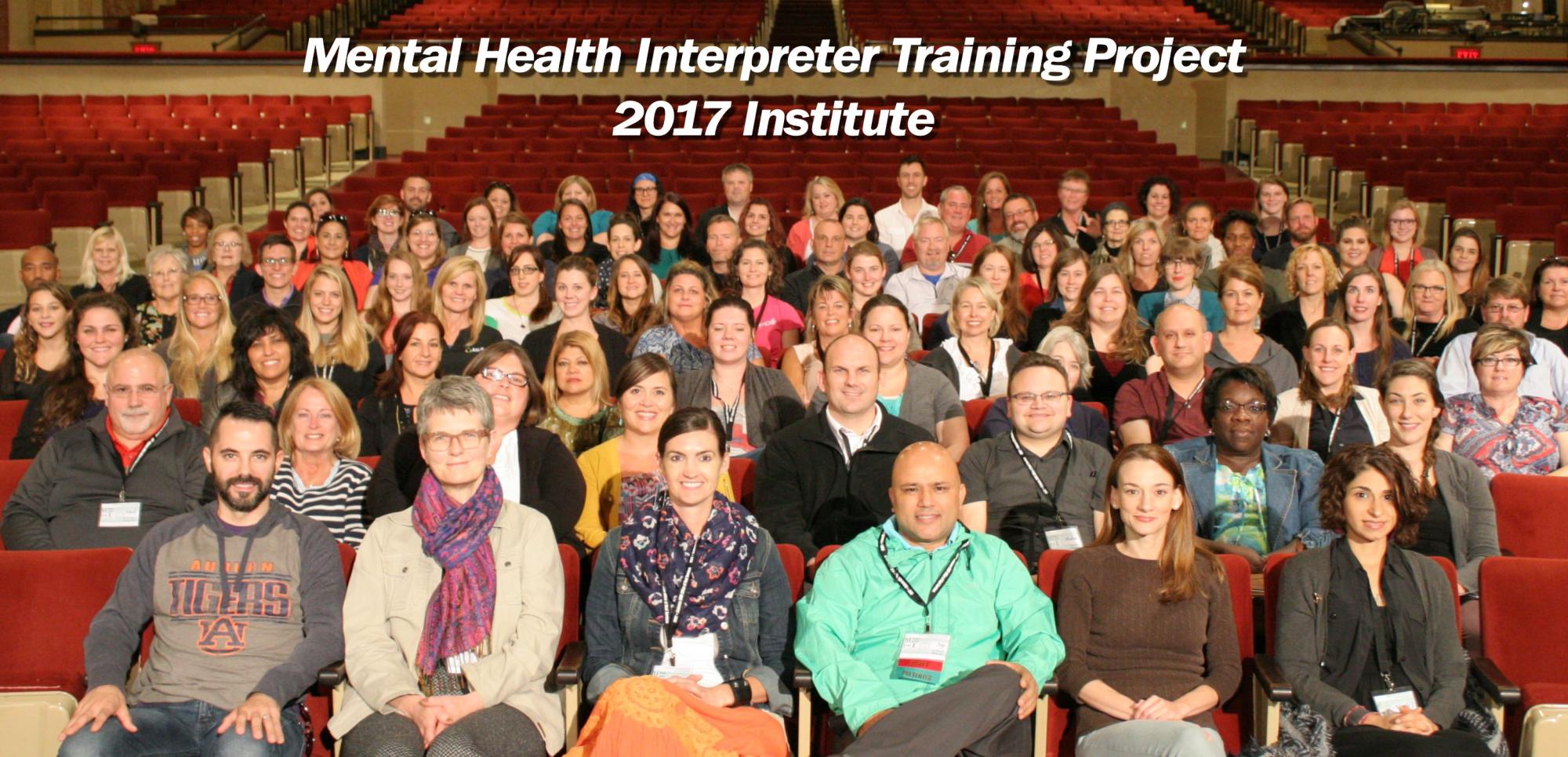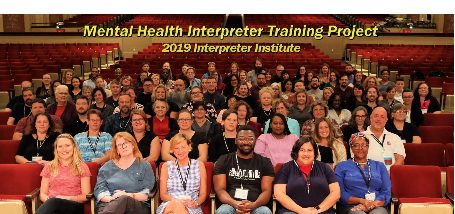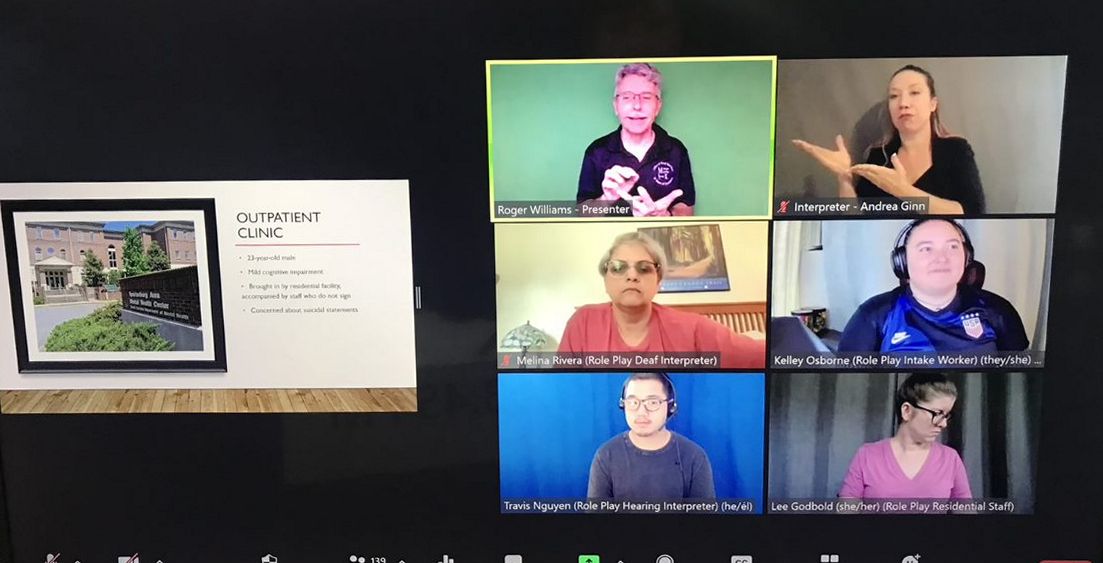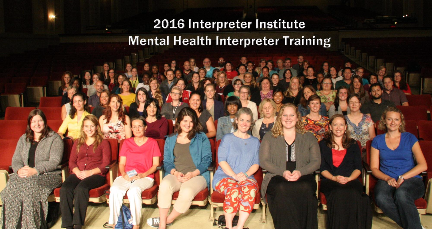Since the first Interpreter Institute, over 1,300 different people have been trained, an average of 67new people every year. Many have attended more than one Institute. Below are class pictures from each of the past Institutes, along with links to our Flickr page where you can see pictures taken throughout each week.
The fourteenth annual institute was another large class with 88 participants and another year with an extensive waiting list. Twenty-seven states are represented with nine Deaf/HH individuals and nine Alumni, including four individuals who are also certified as Qualified Mental Health Interpreters. Partnerships with the Minnesota Dept. of Human Services, Deaf and Hard of Hearing Services Division, the Georgia Department of Behavioral Health and Developmental Disabilities and the Kentucky Deaf and Hard of Hearing Services, Division of Behavioral Health again represented a significant part of the cohort. A new alumni track added an additional 21 attendees. [MORE]
Class of 2016

Class of 2017
This year, the Institute ran July 31 – August 4 and drew 90 participants in the core track and another 47 in the alumni only track. Altogether, 175 people were on hand through the week, including staff and faculty. Participants came from 29 states combined between the two tracks. Delaware and North Dakota were represented in the alumni but not in the core track, which had 27 states represented. In a break from the past several institutes, there were no interpreters from other countries, nor where there any interpreters working in spoken languages. As in the past several years, this class filled up early – this time in mid-February – and waiting list was begun. This list eventually grew to over 70 names before officials just simply stopped accepting more. MHIT has been increasingly more competitive and selective regarding who is accepted.
Class of 2019
Class of 2018


Nearly 175 people from around the country descended on Montgomery, AL July 30th for the week-long 16th annual Mental Health Interpreter Training Institute, held Troy University – Montgomery Campus. Attendees represented 29 states and Canada.
This year, for the third straight year, there were two tracks, one for “first-time” participants, and one for alumni of previous Institutes who wanted to come back to gain further knowledge. The “Core”, which is the main Institute had 91 registered participants, while the Alumni Track had 43. This year’s class was well-educated and experienced. Over a third of the class had Masters degrees in various disciplines. All but a handful were nationally certified for five or more years. There were 11 Certified Deaf Interpreters (CDI). This challenged the instructors to explore the curriculum in great depth, which in turn, challenges the participants.
This year, for the third straight year, there were two tracks, one for “first-time” participants, and one for alumni of previous Institutes who wanted to come back to gain further knowledge. The “Core”, which is the main Institute had 91 registered participants, while the Alumni Track had 43. This year’s class was well-educated and experienced. Over a third of the class had Masters degrees in various disciplines. All but a handful were nationally certified for five or more years. There were 11 Certified Deaf Interpreters (CDI). This challenged the instructors to explore the curriculum in great depth, which in turn, challenges the participants.
Class of 2020
The 17th Annual Interpreter Institute of the Mental Health Interpreter Training Project kicked of August 5, 2019 with a welcome from Associate Commissioner for Mental Health and Substance Abuse Services, Diane Baugher. She addressed a full house crowd of 134 participants, staff and volunteers in the Core session. There were 94 registered participants in the Core Track, another sold out program. They represented 34 states and Canada. Another 49 participants were registered in the Alumni Track, which is open only to people who have attended previous Institutes. Altogether, 38 states and Canada were represented among the participants of the combined tracks. This year’s group was also highly educated with 38 people holding advanced degrees, including two Ph.D.
The 2020 the Mental Health Interpreter Training (MHIT)’s annual event occurred remotely for the first time in its eighteen years. Spread over two weeks, August 3 – 7 for the Core and August 10 – 14 for the Alumni, the event drew over 160 participants.
After it was declared a pandemic on March 13, 2020, COVID-19 changed the way that ODS worked and interacted with others. While teleworking came with new challenges, it also created new opportunities. One of the challenges that immediately appeared was the upcoming MHIT scheduled to occur August in Montgomery. Presenters worked to incorporate opportunities for participants to be engaged in the sessions including polling, discussions in breakout rooms, interactive use of the chat or video functions of Zoom, and even role-play with volunteering participants. Feedback from the participants indicated that the roles plays actually worked better virtually than they did on person, which was a very surprising finding. It also gave practice in utilizing hearing interpreters and deaf interpreters in remote interpreting environments, another unintended benefit.
After it was declared a pandemic on March 13, 2020, COVID-19 changed the way that ODS worked and interacted with others. While teleworking came with new challenges, it also created new opportunities. One of the challenges that immediately appeared was the upcoming MHIT scheduled to occur August in Montgomery. Presenters worked to incorporate opportunities for participants to be engaged in the sessions including polling, discussions in breakout rooms, interactive use of the chat or video functions of Zoom, and even role-play with volunteering participants. Feedback from the participants indicated that the roles plays actually worked better virtually than they did on person, which was a very surprising finding. It also gave practice in utilizing hearing interpreters and deaf interpreters in remote interpreting environments, another unintended benefit.

Class of 2021
The 19th Annual Interpreter Institute of the Mental Health Interpreter Training project was held August 2 – 6, 2021. It was attended. Running virtually for the second time, it was attended by 122 registered participants and 31 presenters, staff, and volunteers. Participants represented 30 states and Canada.
Due to ongoing concerns about the pandemic, the Institute was held virtually again. Usually, all credit opportunities happen during the one week when the Institute in Alabama. Project leaders, Charlene Crump and Steve Hamerdinger, recognizing that “Zoom fatigue is a real problem, split the class over 3 blocks totaling 47.5 hours of continuing education credit opportunities. As in the past, nationally renowned experts shared their knowledge with the participants. Core Instructors included Robert Pollard, Robyn Dean, Steve Hamerdinger, Roger Williams, Angela Kaufman, Mike Harvey, Charlene Crump, Brian McKenny, Kent Schafer, Amanda Somdal, and Carter English.









